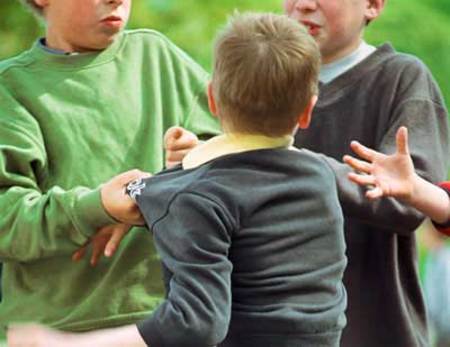Bullying is one of the worst forms of antisocial behavior because it involves exploiting someone else’s personal weakness by frightening that person into acquiescence. Every child fears a bully. Some children are naturally adventurous and enjoy rough-and-tumble play—but this isn’t bullying, because these children’s behavior lacks a malicious or sinister dimension. Bullying involves a deliberate act of coercion. A child bullies for many different reasons:
- Identification with parents. Children “identify” with their parents and copy their behavior. A child of parents who show concern for the feelings of others is more likely to be caring toward other children than she is to be uncaring. A child of parents who believe the best way to deal with others is to threaten them with violence is more likely to express aggression in her relationships than she is to express sensitivity and kindness. Identification means that bullying parents usually have bullying children.
- Release of frustrations. Like adults, children experience anger and frustration, which they should be allowed to release verbally rather than physically. However, some parents discourage their children from voicing negative feelings, preferring all unpleasant emotions to be concealed. A child in this situation can only express her anger outside the family, and this may manifest itself as bullying. The victim becomes the means through which the bully releases her tension. Remember, active play and lots of physical activity is a great release for repressed anger and frustrations in small children.
- Extremes in family discipline. Parents who are either too restrictive in the way they discipline their child (for example, they have very firm and narrow guidelines for acceptable behavior, and punish any infringement immediately) or too permissive (they avoid any rules and let their children do as they please) tend to have children who are aggressive and bullying. A more balanced discipline is preferable.
- Feelings of inadequacy. A child may compensate for poor performance at school or a lack of friends by trying to prove herself in other ways. Aggression toward her fellow pupils may be the one field in which she can come out on top. Unconsciously, this type of child bullies others in the hope of achieving some sort of recognition.
- Unhappiness. Any source of severe and long-term unhappi-ness (such as pressure at home, jealousy of brothers and sisters, or even sickness of a relative) can put a child under considerable stress. When stress of this sort is prolonged, the child may strike out against others.
What is bullying? It occurs when
- your child is verbally threatened, or physically attacked;
- your child is punched or kicked deliberately;
- your child’s lunch is stolen, her homework destroyed, or her backpack dumped;
- your child is tripped or elbowed as she moves around the classroom;
- your child is the subject of verbal taunts and slurs because of who she is—perhaps she has special needs or belongs to a minority group or wears glasses or is short;
- your child is belittled in front of friends, peers, classmates;
- your child is pushed around.
Always treat complaints of bullying seriously. Remember that your child needs a great deal of courage to admit to you that she is being bullied. She may be terrified that you will approach the bully’s parents or teacher and reveal to the bully that your child has lodged a complaint. Fear of retaliation makes most victims remain silent about bullying for a very long time. Reassure your child that you won’t take any action without consulting her first. Try to persuade your child to let you discuss the situation with the other child’s teacher or parent; often, this course of action successfully puts an end to the bullying very quickly.
However, you should also teach your child how to cope with bullying, using the following suggestions:
- Persuade your child to walk away discreetly whenever the bully appears to be moving in her direction. There is a pragmatic realism in the saying, “He who walks away lives to fight another day.” Too often, this type of avoidance strategy is mistakenly construed by the victim as an act of cowardice. Safety is the first priority, and a child who keeps a low profile is less likely to be bullied.
- Encourage your child to show as little reaction as possible to the bully’s threats. Generally, teasing and bullying will stop eventually if the victim displays indifference to the actions against her. Of course, ignoring verbal and physical threats is difficult, but it can be done successfully. One way to help your child achieve this is to role-play a bully situation with you at home. This will let your child develop skills to cope with the real event when it happens.
- Increase your child’s self-confidence. Long-term bullying has the unpleasant side effect of reducing the victim’s self-confidence. A child’s realization that she cannot defend herself from attacks makes her feel inadequate. You can try to compensate for this by reminding your child of her achievements, whether these are in sports, school subjects, music, or in having many friends. Your positive remarks will increase your child’s self-confidence and may indirectly increase her ability to cope with the bully.
- Never tell your child to fight back. Tempting as it may be to encourage your child to retaliate, this advice can have a number of drawbacks. First, your child may not have the necessary physical skills. With your encouragement, your child may go headlong into battle with the bully and actually end up worse off than before. Second, telling your child to fight back simply means that there will now be two violent children instead of one. Third, if your child thinks you believe in aggression—however justified the circumstances may be—she may think aggression is a suitable way to deal with any problem involving others. It isn’t.

